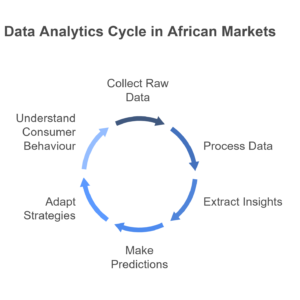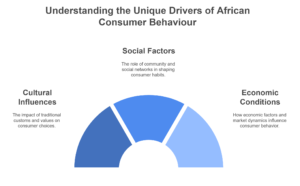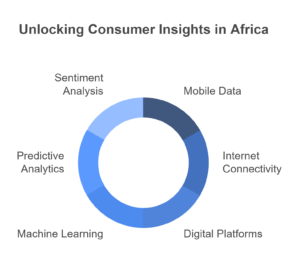In the modern age of information, data is more than just numbers, it is the lifeblood of informed decision-making. For businesses across Africa, the ability to harness data analytics has proven to be a game-changer, especially in understanding and predicting consumer behaviour in this dynamic and diverse market. Across Africa, where markets are diverse, complex, and constantly evolving, data analytics has become a critical tool for businesses seeking to understand and predict consumer behaviour.
This blog explores the essence of data analytics, its impact on predicting African consumer behaviour, and the challenges businesses face while leveraging its potential, along with practical solutions to address these obstacles.
What is Data Analytics?
Data analytics refers to the process of examining and interpreting raw data to extract meaningful insights, identify trends, and make informed decisions. It involves the use of advanced tools, algorithms, and statistical methods to process data, enabling businesses to make accurate predictions and tailor their strategies to market needs.
In the African context, data analytics serves as a bridge between businesses and consumers, providing a deeper understanding of what drives purchasing decisions, how preferences vary across regions, and how businesses can adapt to changing consumer trends.

Understanding Consumer Behaviour in the African Market
Consumer behaviour in Africa is influenced by a combination of cultural, social, and economic factors that set it apart from other regions. Here are some distinctive traits of African consumer behaviour:

Value-Conscious Buyers:
African consumers tend to be highly value-conscious, seeking affordable yet high-quality products. Businesses must analyze spending patterns and pricing sensitivities to strike the right balance between cost and value. Source :
Community-Oriented Decision-Making:
Many African consumers make purchasing decisions based on communal influence, whether through family, friends, or local communities. Word-of-mouth remains a powerful factor, and social media platforms amplify this dynamic.
Preference for Local Brands:
There is a growing preference for local brands that reflect African heritage and culture. Data analytics can identify trends that emphasize the importance of authenticity and cultural relevance.
Adoption of Digital Platforms:
The adoption of digital platforms—such as mobile banking and online shopping—has transformed how consumers engage with businesses. Analytics helps track and predict how these platforms influence purchasing behaviour.
Urban vs. Rural Dynamics:
Urban consumers often have different purchasing habits compared to rural consumers. For example, urban populations may prioritize convenience and speed, while rural consumers might value durability and cost-effectiveness.
How Data Analytics Predicts African Consumer Behaviour
Africa’s digital transformation is unfolding rapidly, with increased access to mobile phones, internet connectivity, and digital platforms. These advancements generate massive amounts of data, ranging from online purchase histories to social media interactions and mobile money transactions. Data analytics plays a pivotal role in decoding these behaviours. By leveraging tools and methodologies like machine learning, predictive analytics, and sentiment analysis, businesses can:

- Forecast Market Demand: Historical sales data and economic indicators can be used to predict future demand for products and services in specific regions.
- Segment Consumers Effectively: Analytics enables businesses to categorize consumers into segments based on demographics, buying habits, and preferences, allowing for more personalized marketing efforts.
- Analyze Social Media Trends: Social listening tools track online conversations, helping businesses understand what consumers are talking about and how they feel about specific brands or products.
- Optimize Customer Experiences: Predictive analytics helps identify pain points in the customer journey, allowing businesses to address them proactively and improve satisfaction.
Leveraging data analytics enables companies to gain deeper insights into customer behaviours, improving their market positioning and customer engagement.
Challenges of Using Data Analytics in Africa
Despite its transformative potential, the journey of adopting data analytics in Africa is not without hurdles:
- Data Quality and Availability:
Many African businesses face difficulties collecting reliable and accurate data due to inadequate infrastructure, unstructured datasets, and inconsistent data collection practices.
- Shortage of Skilled Professionals:
The lack of trained data analysts and scientists in the region hampers the ability of companies to interpret and utilize data effectively.
- Data Privacy and Security Concerns:
Weak regulatory frameworks and a lack of standardized data governance practices discourage businesses from sharing and using data confidently.
- Financial Constraints:
Small and medium-sized enterprises (SMEs), which make up a large portion of Africa’s business landscape, often lack the resources to invest in advanced data analytics tools and technologies.
Practical Solutions to Overcome These Challenges
To unlock the full potential of data analytics in Africa, concerted efforts must be made to address these barriers:
- Infrastructure Development:
Investing in reliable internet connectivity, modern data storage solutions, and technology hubs can improve data collection and management processes.
- Capacity Building:
Educational institutions and international organizations can collaborate to offer training programs that build a skilled workforce in data analytics. These programs should focus on equipping professionals with the knowledge to use advanced tools and derive actionable insights.
- Data Governance Frameworks:
Implementing robust data privacy laws, such as those outlined in the African Union’s Data Policy Framework, can foster trust among consumers and businesses while ensuring secure and ethical data usage.
- Financial Support for SMEs:
Governments, development agencies, and private investors must provide affordable financing options to help SMEs access the tools and expertise needed for data-driven decision-making.
Conclusion
As Africa continues its digital transformation, data analytics will play a pivotal role in helping businesses understand and predict consumer behaviour. From personalizing marketing campaigns to optimizing supply chains, the potential for data analytics is limitless.
However, realizing this potential requires overcoming challenges such as limited infrastructure, lack of skilled professionals, and financial constraints. With targeted investments, capacity-building initiatives, and robust data governance frameworks, African businesses can fully leverage data analytics to drive growth and innovation.
At Marketing Analytics Africa (MAA), we are passionate about empowering African businesses with data-driven marketing strategies. By providing the tools and insights necessary to navigate this transformative journey, we help organizations unlock their full potential in today’s data-centric world.
Ready to unlock the power of data for your business? Let’s start the conversation.




